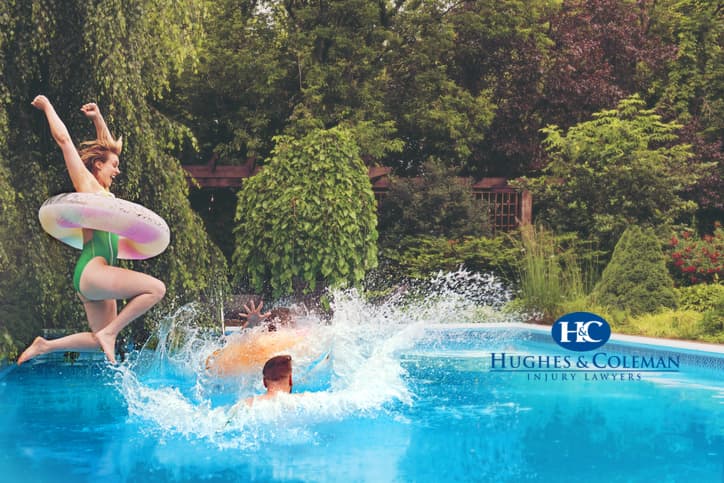
5 Ways to Ensure Swimming Pool Safety
September 4, 2018
With temperatures in the 80 F range, a refreshing swim in the backyard pool is a typical summer activity for families throughout the states of Kentucky and Tennessee. Here’s what you should do to keep your swimming pool safe for your family through the rest of the summer – and beyond.
Swimming and watersports are among America’s favorite summer activities. Swimming has been named one of the top 10 athletic activities in the U.S. Especially during a summer as sunny and warm as this one.
Even in a backyard pool, however, swimming is not without risk. Each year, more than 200 children and young adolescents die in backyard swimming pool accidents. The Centers for Disease Control and Prevention (CDC) report that drowning is one of the leading causes of death in the 1-14 age group and in the case of children aged 1-4 only birth defects claim more lives every year. Evidently, the importance of ensuring appropriate swimming pool safety measures cannot be overstated.
A viral video recorded by one Massachusetts dad a month ago shows just how important it is to double check the safety of a backyard swimming pool. The video shows a two-year-old toddler climbing up a pool ladder approximately 3 times his size. The ladder seems securely locked and shut – but it turned out that the toddler didn’t need the steps to pull himself up onto the pool’s deck.
This incident clearly shows that, first, not all swimming pool safety measures are alike and, second, just how important it is to think outside the box when it comes to ensuring that a pool and its surroundings are safe for children. This blog explores 5 suggestions for better swimming pool safety measures.
Maintain Safety Around the Pool
Many accidents can happen even before a child – or an adult – gets into the pool. Slip and fall accidents can cause serious injuries and even irreversible damage. That’s why the area outside the pool must be kept clean and clear at all times. Since the most common cause of a slip or a fall is an excess accumulation of water around the pool, an appropriate drainage system must be installed, and care must be taken to dry any puddles that can easily become a safety hazard. In addition, using non-slip materials on the pool deck, diving board and ladders can be instrumental in preventing accidents and injuries.
Fence Off
Even the most cautious and vigilant of parents can tell you how easy it is to briefly lose sight of a child. A momentary lapse in a parent’s attention may be just enough time for their child to sprint off toward the swimming pool. The American Red Cross suggests securing the pool with appropriate barriers – for example, a fence that is at least 4-feet high with a self-closing, self-latching gate. In addition, as proven by the video described above, a child’s strength and climbing abilities shouldn’t be underestimated and the fence should be difficult to climb.
Keep the Water Clean
Poor water quality and unmaintained levels can become a safety hazard as well. People or animals swimming in the pool, dead insects and even leaves, grass, and dust can all be sources of microbes in your backyard pool water. If the pool circulation and filtration systems are not adequately maintained, the bacteria and microbes can proliferate and cause nasal, skin or urinary tract infections – among others. On the other hand, excessive levels of chemicals responsible for keeping the water clean – such as chlorine – can cause rashes or other adverse effects. Therefore, such additives must be used strictly as instructed.
Pool Play and Stomach Problems Don’t Mix
The CDC warns that “just one diarrheal incident in the water can release millions of diarrhea-causing germs”. This can easily make other swimmers sick too. Therefore, children with food poisoning or other temporary stomach problems shouldn’t be allowed in the pool. Parents can help keep the water clean and safe for other swimmers by regularly taking their kids on bathroom breaks or – in case of younger children – checking their diapers and changing them in a designated area away from the poolside.
Supervise, Supervise, Supervise
Most swimming pool accidents and drownings happen because of a lack of proper supervision in and around the pool. Never allow your children to play in the pool alone. A responsible adult should be designated to watch swimmers. When playing in the pool with their young children, parents should keep them within arm’s reach. In addition, poor or novice swimmers may require the use of a life jacket.
Swimming pool safety is a serious issue that, if taken lightly, can contribute to serious accidents and even death. In addition, a failure to keep a pool and its surrounding reasonably safe can also lead to legal liability for injuries sustained. Therefore, let’s keep our backyard pools safe this summer by applying these simple yet vital safety measures.

